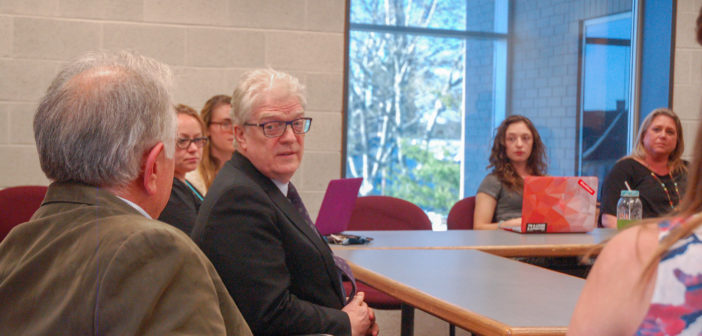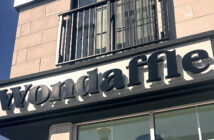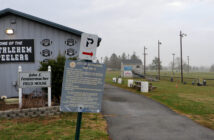A revolution is occurring in education.
The importance of the humanities, science, technology, engineering and mathematics is a never-ending debate among educators. Finding a creative balance between moving students’ feet and solving algorithms is commonly dismissed in the classroom.
Sir Ken Robinson, a world-renowned speaker on creativity in education, spoke at Lehigh on Tuesday as a part of the College of Education’s Distinguished Lecture Series: Leaders of Practice.
Robinson is best known for having the most viewed TED Talk of all time, “Do Schools Kill Creativity?”
His lecture in Baker Hall, titled “Creative Schools: Revolutionizing Education from the Ground Up,” focused on engaging students by introducing creative and personalized methods of teaching.
“Dance is as important as mathematics,” Robinson said to the faculty, students and Lehigh Valley administrators and teachers who gathered in the audience.
Robinson said dance education offers a different way to communicate with others and improve relationships between genders. He also said it is an effective technique to teach students about different cultures.
“The real principle that governs human ability is diversity,” Robinson said. “We have all kinds of abilities across different disciplines and fields.”
Robinson said he believes every school should be different because the world is a community of learners, and diversity is an important base to facilitate learning. He said the current educational system promotes a particular view of academic intelligence, which emphasizes increased output and graduation rates.
Robinson thinks education in the classroom should shift away from an artificial learning environment to a more diverse environment, which would accommodate all types of student learning.
Robinson said great learning happens in groups. Although educators put increasing emphasis on data, scores and rules, he thinks schools must look toward the future of classrooms. That future, Robinson said, is a personalized learning environment.
“We’ve done the same thing in education,” Robinson said. “We have created artificial learning environments for the kids. We have them in classrooms, in desks, day after day and hour after hour, and then we wonder why they fidget and why they get bored. Because (school is) boring.”
Robinson said working in groups or teams will facilitate a creative and engaging learning environment. He thinks this will work to personalize education, sparking a paradigm shift away from the current model.
Regina Braun, the assistant principal at East Hills Middle School and a teacher for over 20 years, said she sees the importance of personalization in the classroom. She said she follows Robinson’s philosophy of personalization in her own school district.
“Personalization is something that (our) administration is trying to implement in our schools,” Braun said. “Having students engaged is great because that is what the kids need to succeed.”
Gary Sasso, the dean of the College of Education, said he asked Robinson to speak at Lehigh to provide insight on how to incorporate creativity into Lehigh Valley school districts.
“He is a vocal critic of our current propensity to rely on tests to tell us to how kids are doing,” Sasso said. “A lot of us at Lehigh believe that it is not the best way to educate.”
Sasso said he hopes introducing Robinson to the Lehigh Valley will stimulate conversations on how to better educate in the classroom.
Braun said it is reassuring that Bethlehem is on the right track to implementing personalization into the district classrooms.
“We have confused academic ability with human intelligence,” Robinson said. “Academic ability is important, but it is not the whole of human intelligence. There would be no music, no business, no dance or no arts.”






Comment policy
Comments posted to The Brown and White website are reviewed by a moderator before being approved. Incendiary speech or harassing language, including comments targeted at individuals, may be deemed unacceptable and not published. Spam and other soliciting will also be declined.
The Brown and White also reserves the right to not publish entirely anonymous comments.